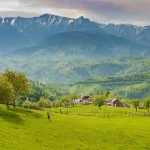
Discovering the Hidden Gems of Djibouti: A Journey Through the Land of Fire and Salt

While Djibouti may not be as well-known as other tourist destinations in Africa, it offers a wealth of hidden gems waiting to be discovered. For those looking to venture off the beaten path, the Goda Mountains are a must-visit. Located in the northern part of the country, these mountains offer breathtaking views and opportunities for hiking and wildlife spotting.
Another hidden gem in Djibouti is the Day Forest National Park. This protected area is home to a variety of plant and animal species, including rare birds and monkeys. Visitors can explore the park on foot or by bike, taking in the lush greenery and tranquil atmosphere.
For beach lovers, Moucha Island is a hidden paradise. Located just off the coast of Djibouti City, this small island boasts pristine white sand beaches and crystal-clear waters perfect for swimming and snorkeling. Arta Beach, located on the Gulf of Tadjoura, is another lesser-known beach destination that offers tranquility and natural beauty.
In addition to natural attractions, Djibouti also offers unique cultural experiences. Visitors can immerse themselves in the traditional way of life by visiting Afar villages and learning about their customs and traditions. Attending local festivals, such as the Festival of the Nomads, is another way to experience Djibouti’s vibrant culture.
Planning Your Trip: Travel Deals and Vacation Packages
When planning a trip to Djibouti, it’s important to find the best deals on flights and accommodations. Many airlines offer regular flights to Djibouti from major cities around the world. It’s recommended to book your flights in advance to secure the best prices.
In terms of accommodations, Djibouti offers a range of options to suit every budget. From luxury resorts to budget-friendly guesthouses, there are plenty of choices available. It’s advisable to book your accommodations in advance, especially during peak travel seasons.
For those looking for convenience and ease of planning, vacation packages and tours are a great option. Many travel agencies offer pre-packaged itineraries that include flights, accommodations, and guided tours. These packages often provide a hassle-free way to explore Djibouti’s top attractions.
The best time to visit Djibouti is during the cooler months of November to February when temperatures are more moderate. However, it’s important to note that Djibouti experiences high temperatures year-round, so it’s essential to pack appropriate clothing and stay hydrated during your visit.
Adventure Tourism in Djibouti: A Thrilling Experience
Djibouti is a paradise for adventure enthusiasts, offering a wide range of thrilling activities. One of the top activities in Djibouti is scuba diving and snorkeling in the Gulf of Tadjoura. The crystal-clear waters are teeming with marine life, including colorful coral reefs, tropical fish, and even the occasional whale shark.
For those who prefer to stay on land, hiking and trekking in the Goda Mountains and Day Forest National Park are popular options. These areas offer stunning landscapes, diverse flora and fauna, and opportunities to spot rare wildlife such as the Djibouti francolin and the Somali wild ass.
The Bay of Ghoubbet is a hotspot for kite surfing and windsurfing. With its strong winds and calm waters, it’s the perfect place to try out these exhilarating water sports. Lessons and equipment rentals are available for beginners.
Luxury Travel in Djibouti: Indulge in the Best
| Activity | Duration | Difficulty Level | Price Range |
|---|---|---|---|
| Hiking in the Goda Mountains | 4-6 hours | Moderate | 50-100 |
| Snorkeling in the Gulf of Tadjoura | 2-3 hours | Easy | 30-60 |
| Scuba Diving in the Red Sea | 4-6 hours | Advanced | 100-200 |
| Camel Trekking in the Danakil Desert | 2-3 days | Difficult | 500-1000 |
| Kayaking in the Gulf of Tadjoura | 2-3 hours | Easy | 30-60 |
For travelers seeking a luxurious experience, Djibouti offers a range of high-end accommodations and dining options. Luxury resorts such as Djibouti Palace Kempinski and Sheraton Djibouti provide world-class amenities, including private beaches, spa facilities, and gourmet restaurants.
When it comes to dining, Djibouti offers a variety of high-end restaurants that serve both international and local cuisine. Le Plateau Restaurant, located in Djibouti City, offers panoramic views of the city skyline and serves a fusion of French and Djiboutian dishes. For a unique dining experience, La Chaumiere Restaurant offers traditional Afar cuisine in a charming setting.
In addition to luxury accommodations and dining experiences, Djibouti also offers exclusive activities for discerning travelers. Private yacht tours allow visitors to explore the coastline and nearby islands in style. Helicopter rides provide a bird’s-eye view of Djibouti’s stunning landscapes, including the Afar Triangle and Lake Assal.
Budget Travel Tips: How to Explore Djibouti on a Budget
Traveling on a budget in Djibouti is possible with some careful planning and smart choices. When it comes to accommodations, budget-friendly options such as guesthouses and hostels are available in Djibouti City and other major towns. It’s advisable to book in advance to secure the best prices.
Transportation in Djibouti can be affordable if you opt for public buses or shared taxis. These options are cheaper than private taxis and offer a chance to interact with locals. It’s also possible to rent a car and explore Djibouti at your own pace.
Many of Djibouti’s top attractions are free or have a minimal entrance fee. Hiking in the Goda Mountains and visiting local markets are great ways to experience Djibouti’s natural beauty and vibrant culture without breaking the bank.
When it comes to dining, street food vendors offer affordable and delicious options. Trying local dishes such as Skoudehkaris (a traditional rice dish) and Fah-fah (a spicy soup) is a must for budget travelers.
Discovering Djibouti’s Rich Culture and Heritage

Djibouti is home to a rich cultural heritage that can be explored through its historical sites, traditional communities, and vibrant festivals. Arta Plage, located on the Gulf of Tadjoura, is a popular destination for history buffs. The area is home to ancient ruins and archaeological sites that date back thousands of years.
Visiting traditional Afar and Somali villages is another way to learn about Djibouti’s cultural heritage. These communities have preserved their traditions and way of life for centuries, offering visitors a glimpse into their unique customs and practices.
Attending local festivals and events is a great way to immerse yourself in Djibouti’s vibrant culture. The Festival of the Nomads, held annually in the town of Tadjoura, showcases traditional music, dance, and crafts. The Djibouti National Day, celebrated on June 27th, is another important event that highlights the country’s independence and cultural diversity.
Djibouti’s Unique Cuisine: A Gastronomic Adventure
Djiboutian cuisine is a fusion of African, Arab, and French influences, resulting in a unique gastronomic experience. One of the most popular dishes in Djibouti is Skoudehkaris, a flavorful rice dish cooked with meat and vegetables. Fah-fah, a spicy soup made with meat and spices, is another staple of Djiboutian cuisine.
When it comes to dining out, Djibouti offers a range of local restaurants and street food vendors that serve authentic dishes. Chez Loulou, located in Djibouti City, is known for its delicious seafood dishes and traditional Djiboutian cuisine. For a taste of street food, head to the bustling markets where vendors sell grilled meats, samosas, and fresh fruits.
Coffee culture is an important part of Djiboutian life. Coffee ceremonies are a common social activity, where coffee beans are roasted and brewed in front of guests. Visitors can participate in these ceremonies and learn about the traditional coffee-making process.
Exploring Djibouti’s Natural Wonders: From Volcanoes to Beaches
Djibouti is blessed with diverse landscapes and natural wonders that are worth exploring. Lake Assal, located in the Afar Triangle, is one of the country’s most iconic attractions. It is the lowest point in Africa and one of the saltiest bodies of water in the world. Visitors can float effortlessly in its buoyant waters and admire the stunning salt formations.
For beach lovers, Djibouti offers a range of beautiful beaches along its coastline. Ghoubbet Bay, located on the Gulf of Tadjoura, is known for its black volcanic sand and clear waters. Doraleh Beach, located near Djibouti City, is another popular beach destination with its golden sand and calm waters.
Djibouti is also home to several mountains and hiking trails. The Goda Mountains, located in the northern part of the country, offer stunning views of the surrounding landscapes and opportunities for hiking and wildlife spotting. The Day Forest National Park is another natural wonder that boasts lush greenery and diverse plant and animal species.
Sustainable Tourism in Djibouti: Supporting Local Communities and the Environment
Djibouti is committed to sustainable tourism practices that support local communities and protect the environment. The country has implemented several initiatives to promote responsible travel, including waste management programs and conservation efforts.
Visitors can contribute to sustainable tourism in Djibouti by practicing responsible travel habits. This includes respecting local customs and traditions, minimizing waste, and supporting local businesses and artisans.
There are also several community-based tourism projects in Djibouti that allow visitors to engage with local communities and support their livelihoods. These projects offer unique cultural experiences such as homestays, traditional craft workshops, and guided tours led by local guides.
In terms of conservation efforts, Djibouti has established protected areas and national parks to preserve its unique flora and fauna. Visitors can support these efforts by following designated trails, refraining from littering, and respecting wildlife habitats.
In conclusion, Djibouti is a hidden gem waiting to be discovered. From its unique landscapes to its vibrant culture, this small country offers a wealth of experiences for every type of traveler. Whether you’re seeking adventure, luxury, or a budget-friendly getaway, Djibouti has something to offer. By practicing responsible travel and supporting local communities, visitors can contribute to the sustainable development of this beautiful destination.
If you’re looking for an exotic and off-the-beaten-path destination, Djibouti should be at the top of your list. This small country in East Africa offers a unique blend of stunning landscapes, rich culture, and fascinating history. Whether you’re interested in exploring the otherworldly landscapes of Lake Assal or diving into the crystal-clear waters of the Gulf of Tadjoura, Djibouti has something for everyone. For more inspiration on incredible travel destinations, check out Destination Mate’s article on the top 10 places to visit in Arizona. From the majestic Grand Canyon to the vibrant city of Phoenix, Arizona is a must-visit for any adventure seeker.
FAQs
What is Djibouti?
Djibouti is a small country located in the Horn of Africa. It is bordered by Eritrea to the north, Ethiopia to the west and south, and Somalia to the southeast.
What is the capital city of Djibouti?
The capital city of Djibouti is also called Djibouti.
What is the population of Djibouti?
As of 2021, the estimated population of Djibouti is around 1 million people.
What is the official language of Djibouti?
The official languages of Djibouti are French and Arabic, although Somali and Afar are also widely spoken.
What is the currency of Djibouti?
The currency of Djibouti is the Djiboutian franc (DJF).
What is the climate like in Djibouti?
Djibouti has a hot and arid climate, with very little rainfall throughout the year. Temperatures can reach up to 50°C (122°F) in the summer months.
What are the main industries in Djibouti?
The main industries in Djibouti include port services, transportation, and telecommunications. The country is strategically located at the entrance to the Red Sea, making it an important hub for trade and commerce.
What are some popular tourist attractions in Djibouti?
Some popular tourist attractions in Djibouti include Lake Assal, the Day Forest National Park, and the beaches along the Gulf of Tadjoura. The country is also known for its unique wildlife, including the Somali ostrich and the Djibouti francolin.
Recent Posts


Discovering the Hidden Gems of Romania: A Journey Through the Land of Dracula
